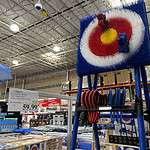















































These are the Best 23 Summer Items at Costco Right Now
Costco buyers work far in advance to find the right items for each season. During Christmas, that includes finding the right toy suppliers and holiday decorations. During the fall it's stocking the store with more items like space heaters that are ideal for cold weather.
As you can imagine, summertime means Costco is getting ready for the heat. That means stores are starting to stock items like air conditioners and fans. In addition, Costco stores are suddenly filled with tens, coolers, and outdoor toys for kids.
Let's take a look at 23 of the best summer items at Costco. Many will be in their warehouses for just a short time, so if anything on this list looks like a purchase you'll want to make, you better act soon!
Eastpoint Sports Axe Throw Set with Throwing Stars
- Manufacturer: Eastpoint
- Price: $59.99 ($10 Off Through May 12th)
Eastpoint's new throw set is introducing axe throwing without the danger to back yards across America. The set has plastic axes and bristles they'll stick into. Then once you're done with summer axe throwing fun, the set easily folds up for storage.
Igloo 83 Quart Dual Zone Active Cooler (80 DZ)
- Manufacturer: Igloo
- Price at Warehouse: $699.99
The sales pitch for Igloor's Dual Zone Active Cooler is pretty simple: it's a cooler that doesn't require ice! The price tag is obviously high at $699.99, but remember that this cooler is very advanced. It can plug into either an electrical outlet or a vehicle if you're camping. In addition it comes with dual zones so you can keep one half freezing and the other half at temperatures more suited to storing drinks.
The Igloor Dual Zone Cooler retails for $999.99, putting Costco's price at $300 below MSRP. It's unlikely you'll find a better deal on this very high-end cooler.
Blackstone 36 Inch Griddle
- Manufacturer: Blackstone
- Price at Warehouse: $369.99
Like many other items at Costco, the price of Blackstone Griddles is cheaper in stores than what you'll find online. The Blackstone 36 36-inch griddle lists for $469.99 on Costco's site, but in stores I spotted them selling for $100 less.
Blackstones have become extremely popular as they offer a large amount of space for cooking on a griddle. If you want a Blackstone but don't want to spend more than $300, Costco also has a 22-inch Blackstone that's portable and retails for $159.99 (next slide).
Blackstone 22 Inch Griddle
- Manufacturer: Blackstone
- Price at Warehouse: $159.99
This is the cheaper Blackstone option and is built to be portable so it's easy to take on adventures like camping for a long weekend. The griddle space is smaller, but it does feature two independent heat zones. This griddle sells for more than $190 when I recently checked on Amazon, so buying it at a Costco warehouse offers significant savings.
Bunch O Balloons - 490 Count
- Manufacturer: Zuru
- Price at Warehouse: $19.99 (On Sale Through May 12)
I had to add this item because we bought them for our kids last year and they loved it. You simply attach a group of balloons to a hose, turn on the water, and then pull them off and they're ready to go! That means no individually filling and tying up dozens or hundreds of balloons.
If you're concerned about plastic waste from balloons, Costco has also stocked reusable balloons from Zuru. They come in packs of 12 and sell for $19.99.
Swing Lounger Chair
- Manufacturer: Outdoor Interiors
- Price at Warehouse: $79.99 (On Sale Through May 12)
Costco has a ton of outdoor furniture in most of their warehouses right now, and the Swing Lounger Chair might be one of the best deals available. First of all, through this weekend it's on sale for $79.99 ($20 off). Second, if you search for the same chair on Amazon it'll cost more than $190, meaning that Costco's price is more than 50% off what you'll find elsewhere.
If you're looking for a comfortable chair that easily packs up for storage when the weather cools, you simply won't beat this price.
Leisure Line Adirondack Chair
- Manufacturer: Lesuire Line
- Price at Warehouse: $114.99 (On Sale Through May 12)
Costco originally had the price on Leisure Line's Adirondack Chairs valid through May 5th, but it extended the sales price through this weekend. The chairs are going for $114.99, which for the quality is a great price. A quick search found chairs from the same manufacturer at Home Depot selling for $167 to $192 depending on the color.
Agio McKinnon 5-Piece Deep Seating Set with Fire Table
- Manufacturer: Lesuire Line
- Price at Warehouse: $2,799.99
This set is truly all you need for a great outdoor space. It comes with two loveseats and two glider chairs that are made out of all-weather wicker. Then, in addition, you get a fire table that can be used as a central table between the whole set. This item has a 4.8 ranking on Costco's website, so buyers have been very pleased. Once again, its warehouse price is also cheaper at $2,799 versus an online price of $2,999.
Crocodile Cave Adventure Waterpark
- Manufacturer: Happy Hop
- Price at Warehouse: $379.99
You have to see this item to believe it! Last year Costco had a giant inflatable waterpark for kids, and they've done it again this year. The Crocodile Cave Adventure Waterpark has a giant waterslide where kids slide out of a crocodile's mouth and also a climbing wall and water cannon. While the set is absolutely huge, it folds up to a much smaller size for off-season storage and also includes an air blower for fast inflation.
Aqua Luxury Pool Recliners (2 Pack)
- Manufacturer: Aqua
- Price at Warehouse: $39.99
A quick search of Amazon pulls up a pool lounger from Aqua selling for $45.59. Here's what makes Costco's deal outstanding: you get two of them for an even cheaper price.
Igloo IMX 70 Quart Cooler
- Manufacturer: Igloo
- Price at Warehouse: $149.99
Coolers that are extremely well insulated have become a "must-own" item in recent years. Companies like Yeti will sell versions often costing $400 or more. That's what makes the Igloo IMO such an outstanding deal, it's a high-quality cooler that sells for just $149.99.
Once again, the price of this item in Costco warehouses is much cheaper than what you'll find online. A quick search shows the same cooler for $172.99 at Target, $195 at Amazon, and $250 on Igloo's site. If you need a cooler with great insulation this summer, you can't beat this deal.
Cascade Mountain Pool Noodle
- Manufacturer: Cascade Mountain
- Price at Warehouse: $19.99
The pool noodles we're all familiar with are cheap. They're foam tubes that cost $10 or less and generally end up laying out in the sun by pools and get thrown away at the end of each season.
That's what makes the Cascade Mountain Pool Noodle such a great purchase if you're out in pools this summer, it's actually very high quality! The noodles are far more durable (chlorine resistant with vinyl coating) and also better support floating. I picked up a couple for my family's trips this summer.
Sea Serpent Sprinkler
- Manufacturer: H2O Go
- Price at Warehouse: $49.99
The Crocodile Cave Waterpark isn't the only massive inflatable at Cosco this summer! Another option that's also large and sure to entertain your kids is the Sea Serpent Sprinkler. This inflatable is much cheaper at $49.99. It has two separate sections that rise in the air and have sprinklers underneath. My crazy idea (that my wife didn't love, but the kids did) was running two slip and slides underneath the Sea Serpent for an ultimate summer day.
Body Glove Inflatable Stand-Up Paddle Board
- Manufacturer: Body Glove
- Price at Warehouse: $399.99
The Body Glave Paddle Board is very large, but it's actually quite portable. You can inflate and deflate it (electric pump included) so it can be easily stored in a backpack. This item is available for the same price as warehouses on Costco's website, so ordering online is another option. It's currently rated a 4.7 out of 5 from 42 reviews.
H2Go Family Lounge Pool
- Manufacturer: H2O Go
- Price at Warehouse: $39.99
If you're looking for an inflatable pool to escape the heat on summer days, the H20 Go Family Lounge Pool will get the job done. The pool carries up to 307 gallons and has a bench to sit in if you're watching little kids. It should be noted that the item carries just a 3.5-star review on Costco's website because of complaints about leaks and ease of use (emptying 300 gallons of water isn't always simple!). So, if you're looking for something more robust, you may want to pass on this item and instead look at Costco's other above-ground pool options.
Tommy Habahama Rolling Patio Cooler
- Manufacturer: Tommy Bahama
- Price at Warehouse: $149.99 (On Sale Through May 12)
First off, I have to note that this cooler is on sale (saving you an impressive $50) through May 12th. The Tommy Bahama cooler is perfect if you're entertaining this summer. It has 100 quarts of storage capacity and is an excellent way to store things like drinks in ice. In addition, it create another table top that you can leave food on or even use for some prep work as well.
Cascade Mountain Travel Hammock
- Manufacturer: Cascade Mountain
- Price at Warehouse: $14.99 (On Sale Through May 12)
I bought two of these hammocks for my kids and set them up in my backyard between trees. They replaced a prior hammock that was significantly more expensive. Another advantage of these hammocks is that they're built to be portable. They fold up and can be stored in a travel bag if you want to take them camping. If you grab a travel hammock (or two) by close on Saturday, you'll also save another $5.
Timber Ridge Zero Gravity Chair
- Manufacturer: Timber Ridge
- Price at Warehouse: $89.99
Let's face it, most portable chairs aren't very good. They're built to be portable and are generally pretty cheaply made. The Timber Ridge Zero Gravity Chair is one of the nicest outdoor chairs you can find. The chair is portable, but it also comes with significant padding and sturdy construction. In addition, it can lay flat and has a large carrying capacity of 350 pounds.
If you're looking for a chair that blends portability and comfort, this is a top purchase at Costco this summer.
42" Boogie Board
- Manufacturer: Scott Burke
- Price at Warehouse: $29.99
If you're heading to a beach on the ocean, a boogie board is a must-have item. A quick search of Amazon shows Scott Burke 42" Boogie Boards selling for $79.95 and $89.99. The bottom line is that this is a higher-quality boogie board than you'll get if you buy one at a shop near the beach, and it's at a price dramatically lower than Amazon sellers.
Kona Hammock Float
- Manufacturer: Big Joe
- Price at Warehouse: $39.99
We featured pool loungers earlier, but the Big Joe Kona Hammock Float may be more your speed. First of all, no air is required. The Kona Hammock Floats have insulation so they'll float without being pumped up. Second, the floats are quick-drying so if you want to pull them out of the pool before traveling they won't be soaking for days.
Tobin Sports Wavebreak Kayak
- Manufacturer: Tobin Sports
- Price at Warehouse: $169.99 (On Sale Through May 15)
The Tobin Sports Wavebreak 2-Person Kayak is large enough to support up to 440 pounds. You'll get the kayak, a pair of oars, an Airhammer Hand Pump, and also a carrying bag. If you've been looking for a portable kayak, this price is extremely hard to beat. The price is also cheaper in warehouses than what you'll find listed on Costco's website.
Nighthawk Towable Tube
- Manufacturer: HO Sports
- Price at Warehouse: $199.99
If you own a boat, this is a must-own item. The Nighthawk 3 Towable is a tube that has carrying room for 3 riders. It includes an electric pump, so you can deflate it and store it when not in use.
Bond Steel Patina Gas Fire Pit
- Manufacturer: Bond Steel
- Price at Warehouse: $249.99 (On Sale Through May 13)
Fire pits make outdoor spaces come to life. The Bond Teel Gas Fire Pit has an attractive design and a 4.7-star rating on Costco's website. Most importantly, the savings are outstanding when buying one of these in Costco's warehouses. I spotted these fire pits selling for $249.99, which is significantly cheaper than the $349.99 price listed on Costco's online store.